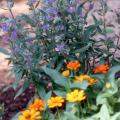News From 2002
By Norman Winter
MSU Horticulturist
Central Mississippi Research & Extension Center
It seems that unless a plant is a flashy bloomer like New Gold lantana, then it really doesn't get the recognition it deserves. One such plant is the bluebeard, known botanically as Caryopteris x clandonensis, and called caryopteris by most gardeners who grow it.
MISSISSIPPI STATE -- Shrimp harvesters in Mississippi's Gulf waters are reproducing last year's above-average catch, but they have little reason to celebrate as prices run about 20 percent lower than in 2001.
Brown shrimp season opened in Mississippi June 6. Shrimpers landed about 1 million pounds in Biloxi ports during the first week of the season. Shrimp in 2002 are smaller than those caught during the opening of the 2001 season, which was an excellent year for production.
By Charmain Tan Courcelle
MISSISSIPPI STATE -- Supplementing poultry diets with activated carbon or other odor absorbers may help take the stink out of chicken manure.
Russell Bazemore, aroma chemist with the Mississippi Agricultural and Forestry Experiment Station, is working on methods to control the odor of poultry manure using absorbers, deodorizers and other chemical compounds. His research may provide relief from unwanted odors for farmers and their neighbors.
By Norman Winter
MSU Horticulturist
Central Mississippi Research & Extension Center
Gardeners, get your checkbooks out and start shopping for daylilies. Ideal planting time was a couple months ago, but daylilies are blooming everywhere now, and this will aid you in making your selections.
I'll confess that in the past, I have looked at daylilies with tunnel vision. I have only wanted those that give the best landscape impact for massing as a bedding plant. For this type of use, one has to admit that Stella d Oro is No. 1.
By Ned Browning
JACKSON -- Mississippi's predominantly rural communities must respond to a new economy with redoubled educational efforts, according to a just-released report "Mississippi: A Sense of Urgency."
Gov. William Winter and other state leaders discussed the Southern Rural Development Center white paper at the Stennis Institute Capitol Press Luncheon on June 10 in Jackson.
MISSISSIPPI STATE -- Most of the state's corn is entering a critical growth period in serious need of water, but a good rain now still can help boost yields at harvest.
Erick Larson, grain crop specialist with Mississippi State University's Extension Service, said most corn was in the pollination stage by mid-June.
"Corn has the highest demand for water during pollination," Larson said. "Rainfall now could significantly improve corn yield potential in most of the state."
MISSISSIPPI STATE -- The changes brought by the new Farm Bill will be the subject of four informational meetings held around the state the week of June 17.
Mississippi State University's Department of Agricultural Economics, Mississippi Farm Bureau and the Mississippi Natural Resource Conservation Service are sponsoring the informational meetings. Each will run from 9:30 a.m. to 2 p.m.
By Norman Winter
MSU Horticulturist
Central Mississippi Research & Extension Center
This time last year I accepted a new challenge, horticulturally speaking, when my family moved into another home with a sun-challenged yard. Shade inspired us to plant azaleas, hostas, ferns and cast-iron plants like crazy, but some of the most enjoyable flowers have been the impatiens, especially the Fiesta double or rose-form impatiens.
By Bethany Waldrop Keiper
MISSISSIPPI STATE -- Faith Hill, Archie Manning and Morgan Freeman -- what could these Mississippi success stories possibly have in common? They all share a four-leaf bond -- 4-H.
Since its beginnings in the early 1900s, 4-H offers youths from farm or working-class families the opportunity to develop important life skills.
MISSISSIPPI STATE -- Youth from 77 Mississippi counties came to Mississippi State University the first week of June to continue a 78-year-old tradition of competition, socialization and service.
4-H Congress was held June 4 through 6 in Starkville. Susan Holder, state 4-H program director with MSU's Extension Service, said 456 4-Hers ages 14 to 18 attended Congress, with the support and assistance from 89 volunteers and 85 4-H staff from across the state.
MISSISSIPPI STATE -- With prices about 25 percent lower than they were last year, dairy farmers are having a difficult time making a profit, but they will soon get government assistance.
Bill Herndon, agricultural economist with Mississippi State University's Extension Service, said prices are as bad now as they were in 2000, which was a very tough year for the dairy industry.
MISSISSIPPI STATE -- The Mississippi Agricultural Economics Association invites those interested in learning about structural changes in an emerging food industry to their June 14 annual conference.
The meeting will be held from 8:30 a.m. to 1 p.m. in the Bost Extension Building at Mississippi State University. Registration is from 7:30 to 8:30 a.m., and the $25 cost includes lunch. Organizers encourage early registration.
GREENVILLE -- The 1990s were times of growth and prosperity for the catfish industry, but these days, Delta farmer Brent Johnson would just like to break even on his production costs.
Johnson said catfish are bringing between 55 and 56 cents a pound when he sells them to processors. Since it costs him close to 70 cents a pound to grow the fish, he is losing money on every pond he harvests this year.
By Charmain Courcelle
BILOXI -- Mississippi State University researchers at the Coastal Research and Extension Center in Biloxi are developing water discharge options for the catfish and horticulture industries.
Environmental standards for pond effluents and horticultural runoffs have not been passed yet, but the Environmental Protection Agency has actively considered a national set of regulations to limit the release of nutrients from these operations for several years.
By Norman Winter
MSU Horticulturist
Central Mississippi Research & Extension Center
One of my favorite plants since I was a child has been moss rose. Moss rose is known botanically as Portulaca grandilfora and has green fleshy succulent leaves with unbelievable flower power.
Moss rose is native to Brazil and has a ground-hugging habit, which means you cover much more space with fewer plants.
MISSISSIPPI STATE -- Unseasonably cold weather in May hurt cotton and led to increased numbers of thrips in many crops, but a bigger problem has been too much or too little rain.
Charlie Wax, state meteorologist at Mississippi State University, said May temperatures ranged from 5 to 9 degrees below normal. The Coast was comparably colder and drier than the rest of the state. Many areas received rain the last few days of May.
VERONA -- Farmers from across the state can learn the latest research results and recommendations at the upcoming North Mississippi Research and Extension Center Agronomic Row Crop Field Day.
The event will take place Aug. 8 at the Lee County AgriCenter on Highway 145, south of Verona.
"We believe we will have a very educational field day. This is a chance for growers to keep on the cutting edge of farming technology," said event coordinator Normie Buehring, senior agronomist and superintendent of the Northeast Mississippi Branch Experiment Station.
By Norman Winter
MSU Horticulturist
Central Mississippi Research & Extension Center
It seems no new plant has captured the fancy of gardeners this year like the gaura. From Picayune to the Madison County garden tour and right on up to Oxford and Tupelo, everyone has been admiring the gaura.
Gaura is still a new plant to the majority of gardeners, but leaders of garden clubs and horticulture tours are catching on to the enthusiasm for this plant's unique floral display.
By Jeanie Davidson
MISSISSIPPI STATE -- Summer campers usually try to avoid insects, but the children and adults at Entomology Camp 2002 will enjoy finding as many as possible.
"This is one of the few camps where professionals who work in the field help campers one-on-one," said Mike Williams, program director and entomologist for Mississippi State University's Extension Service.
By Jeanie Davidson
MISSISSIPPI STATE -- Cultivating food plots is an ideal way to provide much-needed forage for wildlife through late summer and attract these animals before hunting seasons begin.
Pages
News Types
- Crop Report (424)
- Feature Story (5869)
- Feature Photo (53)
- Extension Outdoors (318)
- Southern Gardening (1448)
- Extension Inbox (95)
Archive
- 2024 (175)
- 2023 (182)
- 2022 (187)
- 2021 (177)
- 2020 (212)
- 2019 (223)
- 2018 (276)
- 2017 (338)
- 2016 (383)
- 2015 (457)
- 2014 (498)
- 2013 (490)
- 2012 (492)
- 2011 (356)
- 2010 (323)
- 2009 (313)
- 2008 (273)
- 2007 (263)
- 2006 (252)
- 2005 (278)
- 2004 (273)
- 2003 (279)
- 2002 (228)
- 2001 (238)
- 2000 (243)
- 1999 (233)
- 1998 (232)
- 1997 (239)
- 1996 (58)
- 1995 (36)





